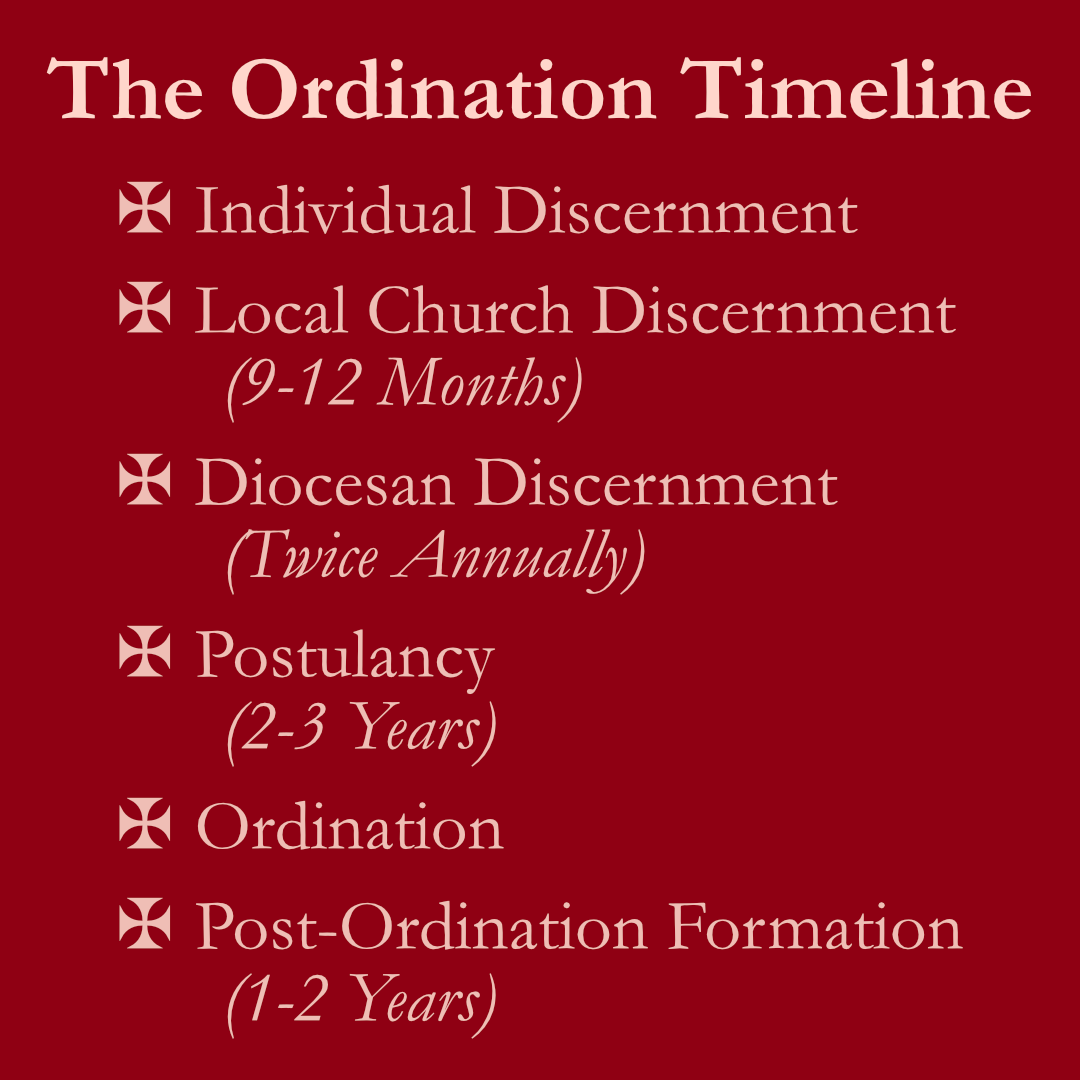
Considering Ordained Ministry
All baptized Christians are called to serve the Lord (Eph. 2:10), offering spiritual worship through sacrificial self-giving (Rom. 12:1-2) as priests in the new Temple, the Church (1 Pet. 2:4-9). Some, however, are called to be gifts to the Church, set aside through ordination “to equip the saints for the work of ministry, for building up the body of Christ, until we all attain to the unity of the faith and of the knowledge of the Son of God” (Eph. 4:11-16).
-
The process of ordination begins with the discernment of a call to ministry. The question is not primarily one of desire, but obedience to the Lord’s will. For some, this inward movement by the Spirit to be set aside for ordained ministry has been clear for some time, though for others the call emerges slowly. While we do not discern a call to ordained ministry in isolation, personal conviction of a call is required. During the Examination section of an Ordination, the ordinand must answer positively, “Do you believe that you are truly called, according to the will of our Lord Jesus Christ, and in accordance with the Canons of this Church, to this Office and ministry?” The context for this season is important. We do not discern in isolation, but within the context of the fellowship, worship, and life of the Church in which we are discerning a call.
-
After a call has been individually discerned, the next step is to meet with the Rector or Priest-in-Charge at your local church. Over the course of several conversations your Rector will help explore the nature of your call, how God has ordered your life towards this call, if married how this call will impact your spouse and children, your theological understanding of holy orders, and other topics. If your Rector affirms a call in your life you will progress to the next stage of Local Church Discernment.
A Discernment Committee composed of members from your congregation will be formed to continue to assess your calling. Over the course of six to nine months you will meet to discuss your prior discernment, your current spiritual disciplines, examples of prior leadership, your understanding of the Anglican tradition, the Sacraments, and the work of the Church. If the Discernment Committee also affirms your call you will then move on to the third stage of Local Church Discernment.
The Rector and Discernment Committee will now present you to the Vestry for an interview. Working with the Rector and Discernment Committee’s reports, the Vestry will interview the Candidate and if they affirm the call will then draft a recommendation letter to the Diocese to advance the candidate.
-
During this phase of discernment you will meet with the Bishop’s Advisory Council on Ministry. This Council, comprised of the Bishop and leaders from the Diocese, will will build upon the prior discernment work by continuing to explore your understanding of Holy Orders, your previous education and options for seminary formation, and the specifics of how you believe the Lord is calling you to serve in his Church as a Deacon or Priest. If the Bishop affirms the prior work of discernment, you then shift from being an aspirant to holy orders to a postulant.
-
The season of postulancy is centered around education, training, and spiritual formation. During this time postulants begin their theological training at one of the approved seminaries, engage in spiritual direction, and are often given opportunities to lead within the Local Church. Throughout this process the postulant will write Ember Day Letters to the Bishop, which help foster a relationship with the spiritual father of the Diocese and mark the progress in formation. When seminary training is nearing completion the postulant will work the the Diocesan office to schedule canonical exams, psychological evaluation, and a physical. The postulant will also work with the Canon for Clergy Formation to develop a Diaconate Ministry Plan.
-
All ordinations to the Diaconate, whether Transitional or Vocational, take place during the annual Synod in October. Before your ordination you will go on a retreat to give space for prayer, receive instruction, have an opportunity for confession, and be encouraged.
For those who are called to the Presbyterate, they will serve as a Transitional Deacon in at least one Local Church for one year. During this year there is continued formation, training, and care as you continue to deepen and live into your calling. The Canon for Clergy Formation and Bishop will work together with you to schedule your ordination to the Presbyterate, which is typically hosted by your Local Church. Before the ordination there is one more instructed retreat to provide final training, prayer, and encouragement.
-
In the season following ordination either as a Vocational Deacon or Priest there is continued formation, training, and encouragement. Newly ordained Priests will work with the Canon for Clergy Formation to craft a Curacy plan to complete their formation as a Priest to serve within the Diocese.

